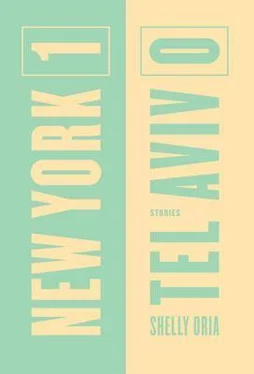We’re practically out when Zoë says, I need to go to the bathroom. It’s okay, I tell her. It’s not okay, though, because bathroom of course means Keith Buckley. It’s also not okay that whenever Ron isn’t around, something shifts between us and she says things like I need to go to the bathroom when she means I can’t leave without trying to talk to Keith . I want to say, I’ll wait outside then, but instead I say, Want me to go with you?
* * *
This is why I moved to New York: I didn’t want to go to India. Or South America, or Australia. In Israel, this is what you do when the IDF gives you your freedom back: you work and save money for about a year, and then go backpacking in a place cheap enough to host you for a long time. I was on that track just like everyone else, but when it was time to go, I realized that I never cared much for India and that the friend I was supposed to travel with, a gay guy named Yoni, was actually not completely gay and possibly in love with me. I was not in love with Yoni and not in love with India, but staying in Tel Aviv meant starting my life, or at least going to school. It’s a scary thing, starting your life. So I signed up for cooking classes and flew to Manhattan, because that’s where they were.
* * *
Keith Buckley is signing his WebBook and looking at Zoë like he can’t quite place her. He seems troubled. Zoë is oddly quiet, standing still and waiting. Then Keith Buckley stops moving his pen, looks up once again, stares at Zoë. Something is happening, but I don’t know what. I look at Zoë; if she has any answers, she’s keeping them to herself. Keith Buckley says, I’m sorry, I have to ask; are you…? Is that you? Zoë’s voice is flat when she says, Am I who? I can see that Keith Buckley needs to take a deep breath, but he doesn’t. Have you been stalking me? he asks. No, Zoë says quietly. Keith Buckley doesn’t know what to do with her answer. She looks him straight in the eye and repeats, No. Inside my left ear, someone is scratching a chalkboard with long nails. Finally, Keith Buckley stops staring at Zoë, adds “uck” to his “Best of L,” and she grabs the book, turns around. I follow Zoë’s back out of the store, and it doesn’t take as long this time. Her shoulder blades are sharp like they have some protecting to do. I feel an urge to touch them, as if they will soften when I do, and we will leave the store transformed, having learned something together.
* * *
When we step outside, we see Ron waiting for us. Zoë isn’t happy to see him, and her upper lip tightens. My favorite girls, he says, and hugs us both, a three-way, end-of-the-week hug. He smells like he’s already been home and taken a shower, and his scent calms me down. I cling to him and kiss his neck. For a few seconds, I feel hopeful, like maybe now we can double-click and delete, start the evening over. Zoë finds her way out of our hug and says, I’m not going home now. She sounds like a rebellious teenager. Daddy Ron says, Who said anything about going home? I thought we’d go out. Zoë says, Well I’m meeting someone. Then she quietly adds, A friend. She looks at me for help, but I look away, I look down. I see a cigarette butt on the concrete and wonder if it’s Zoë’s butt from before. Ron says, Zo, we said something about Saturday nights, remember?
Three weeks ago, we went out and saw a movie about a strikingly short ten-year-old boy who wants to make it to the NBA. He doesn’t, but by the end of the film he’s living on a farm, growing tomatoes and looking content. It was a bad movie that put us in a good mood. On the way home, I had my left hand in Zoë’s back pocket while Ron held my right one, and I felt like I do on steamy days when I step into the big refrigerator at the restaurant. An hour later, we were sitting on cushions in our living room, playing poker and drinking wine, and Ron started mimicking the short boy’s voice at thirteen, squeaky and whiny with basketball heartbreak. Zoë did the mother, opening every sentence with a dramatic “My child…” and I kept giving them more and more lines from the movie — I’m the one with the good memory. That night, before we fell asleep, Ron hugged his pillow and said, I think we should do this every week. I said: Great idea, and: Saturdays could work, they never give me this shift at the restaurant anyway. Zoë nodded a lot and looked stern.
Now Zoë says, Well, we haven’t done anything about it, so I sort of thought it was off. Ron is disappointed; he stares at nothing without blinking. He doesn’t want to pick a fight, though; he never does. Then he strokes my hair absentmindedly. Ron and I hardly ever have sex without Zoë anymore, and something in the way he strokes my hair explains why. Looks like it’s just the two of us then, he tells me, but he’s looking at Zoë.
* * *
After I slept with Ron the first time, on the floor of my old apartment in Hell’s Kitchen (not because it was sexy but because the mattress was too small and smelled of the people who used to own it), we talked about Identity. Ron’s family immigrated to the United States when he was in high school, after his father, an importer/exporter, couldn’t make good on a deal he’d made with the Israeli Air Force. Ron said, I’ve always felt Israeli in America, but if I went back today I’m sure I’d be the American in Israel. You never know, I said, maybe you should try. I can’t, he said, because of my dad. I didn’t know how to answer that, so I didn’t. Then he said, There’s something I need to tell you. It’s generally not what you want to hear when you can still feel the cold floor against your naked back, but I didn’t mind it too much; his tone suggested potential, not threat. He said, I have a girlfriend, but it’s not like that, we have an open relationship. I said, There’s something I need to tell you, too: I’ve been mostly into women for the longest time; you’re the first man I’ve been with in maybe five years. Really? I would never have thought that, he said. He stretched back until his head touched the book stand behind him; he looked at me like he was seeing something new, like he was disappointed in himself for having missed it before. I think you and Zoë might really like each other, he said; we should all go out sometime.
* * *
In my fantasy, our love is a visible thing. We don’t even have to be together for people to see it. When I’m with Zoë, when I’m with Ron, when the two of them are without me, maybe even when one of us is walking down some street alone, people can tell that what they are seeing is part of something else, that a piece is missing. And when the three of us are together, people get it; they smile at us and suddenly they think, Why not?
Maybe there’s something about our love they find inspiring. Maybe they look at us and forget what it is they are supposed to find strange. And maybe they, too, have more than one person they love, more than one person they call to trash Deli Guy who gave the wrong change again, more than one person whose morning breath they love waking up to.
* * *
But reality is often quite different. At a bar two blocks from the bookstore, Ron and I sit on barstools, looking something like a brother and sister who’ve just learned of a death in the family. I look at Ron’s beer and realize it will take some time for him to get happy at this rate. I push my White Russian in his direction, but I know he’ll say it’s too sweet. He makes a face. I don’t know how you drink this shit, he says. He’s cranky, and I want to say something that would change that, but I’m thinking: Stalking, problem, greedy; my words are all wrong. It’s not a friend, is it, he says, and there’s no question mark at the end of his words. I shake my head. I mean, we know all her friends, he says, if it was really a friend she’d say his name. I wait a few seconds before I say in Hebrew, Ron, we don’t know all of her friends.
Читать дальше












